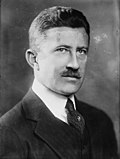| |||||||||||||||||
| |||||||||||||||||
 County results Hale: 40–50% 50–60% 60–70% Johnson: 50–60% | |||||||||||||||||
| |||||||||||||||||
The 1916 United States Senate election in Maine was held on September 11, 1916.
Contents
- Democratic primary
- Candidates
- Results
- Republican primary
- Candidates 2
- Results 2
- Socialist primary
- Candidates 3
- Results 3
- Progressive primary
- Candidates 4
- Results 4
- General election
- Candidates 5
- Results 5
- See also
- References
Incumbent Democratic Senator Charles F. Johnson ran for re-election to a second term in office, but was defeated by Republican Frederick Hale, the son of Johnson's predecessor Eugene Hale.

